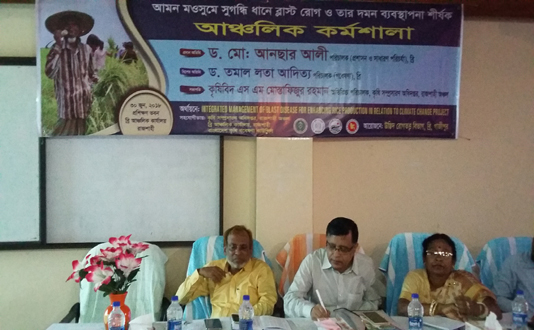RAJSHAHI, June 30, 2018 (BSS)-Paddy scientists and researchers here have
underscored the need for acquiring updated knowledge for a proper management
of blast disease in aromatic rice in transplanted Aman season.
The field level extension officials and others concerned should be equipped
and enriched with modern ideas so that they can manage the disease for
boosting rice production in the greater interest of food security.
They made this observation while addressing a regional workshop titled
“Blast Disease and its Management in Aromatic Rice in Transplanted Aman
Season” in Rajshahi city today.
Regional station of Bangladesh Rice Research Institute (BRRI) organized the
workshop at its training dormitory discussing ways and means on how to manage
the disease collectively.
Integrated Management of blast disease for enhancing rice production in
relation to climate change project financially supported the workshop.
BRRI Directors Dr Ansar Ali and Dr Tomal Lota Aditya addressed the workshop
as chief and special guests respectively with additional director of DAE SM
Mustafizur Rahman in the chair.
More than 100 scientists, researchers, extension officials and other
stakeholders joined the workshop sharing their views on the issue.
During their keynote presentations, Plant Pathology Division Head of BRRI
Dr Abdul Latif and Deputy Director of Department of Agriculture Extension
(DAE) Monojit Kumar Mallik described how to manage the disease.
They revealed that incidence and severity of blast disease of rice is being
recorded in all agro-ecological zones of Bangladesh during transplanted Aman
seasons.
However, disease incidence and severity was higher in irrigated ecosystem.
Disseminating their expertise they also mentioned the disease has emerged
in the country due to adverse impact of climate change. So, the field level
officials and staff concerned should remain vigil to detect the menace for
its early management.
Dr Ansar Ali told the workshop that BRRI has been working relentlessly to
boost rice production through integrated management of the existing diseases
for the sake country’s food security.



